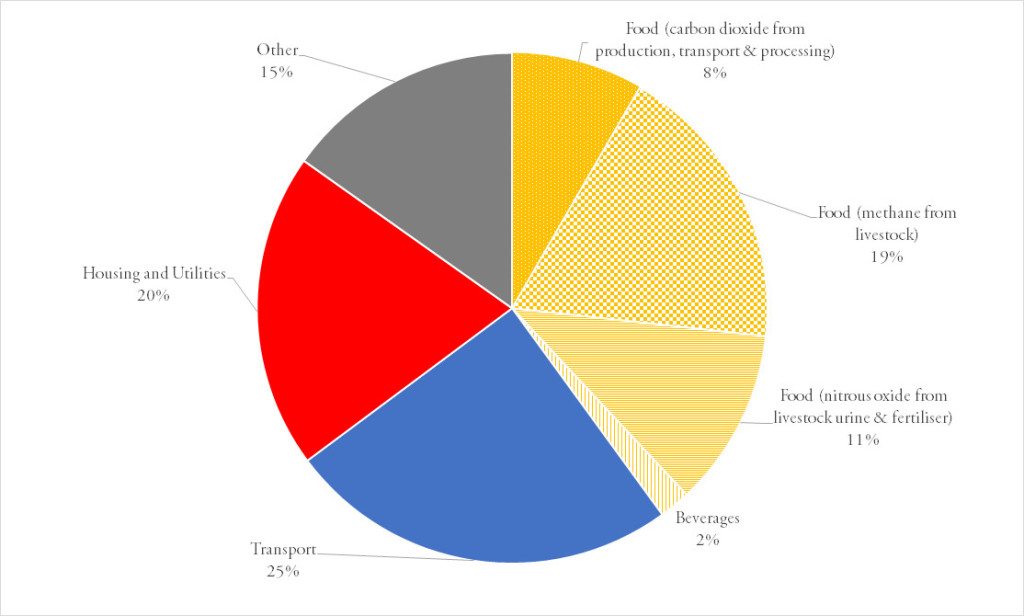The carbon footprint of the average Kiwi household is getting smaller, but there is still plenty of room for improvement, suggests new research.

According to a new working paper from Motu Economic and Public Policy Research, consumption emissions from individual households fell by almost 5 percent since 2007. However, due to the rise in New Zealand’s population, the total amount of greenhouse gases entering the atmosphere from Kiwi households’ overall consumption is increasing.
Transport and food were the largest sources, responsible for the majority of households’ emissions. Households looking to reduce their emissions should look at what they consume in these categories first, so they can make meaningful change, say the authors of the report.
“We’re hoping our research will help householders understand the impact of their spending choices and identify the most significant opportunities to mitigate their impact on emissions, said Dr Suzi Kerr, Senior Fellow at Motu, in a media release.
“Climate change solutions are possible at the individual level and we hope this shows people how to take effective action.”
The Science Media Centre collected the following expert commentary.
Prof Ralph Sims, Professor of Sustainable Energy & Director, Centre for Energy Research, Massey University, comments:
“This is an excellent and innovative analysis that confirms why New Zealanders have one of the highest annual greenhouse gas emissions per person in the world.
“It also identifies where an individual can reduce their carbon footprint in the short term, but without reducing their lifestyle.
“In fact there could be benefits such as choosing to walk or cycle a short journey to buy a bottle of milk or a newspaper rather than drive:-
a) there is a health benefit from the exercise;
b) at around $1 per kilometre for the cost of owning and operating a modern family-size car (based on AA analysis), the cost of a 2 km return journey can be higher than the price paid for the milk or the paper; and
c) personal greenhouse gas emissions are reduced by leaving the car in the garage.
“Using energy wisely in the home has long been promoted such as in EECA TV adverts and electricity company advice. Most homes could easily reduce their annual energy bills by 10-20% but without feeling cold or doing without. So with ever-increasing gas and electricity bills, I can never understand why people complain, but then fail to try and use their energy more efficiently, whether it be for heating water, heating or cooling rooms, lighting, running appliances, or cooking.
“Food choice and preparation is one area where it is also easy for someone to reduce emissions.
“Growing food for the world’s population, plus processing, transporting, storing, retailing and cooking it, uses around one third of all end-use energy consumed in the world and produces around one quarter of the world’s total annual emissions of greenhouse gases (FAO, 2012).
“Yet we fail to consume one third (yes, ONE THIRD) of the food we produce.
“So only preparing enough food to meet the family demand at meal time; not over-eating (New Zealand has very high obesity rates); using up any leftovers in future meals (with many good recipes available such as using stale bread in bread and butter pudding; buying only what fresh food is needed from a supermarket to avoid having to throw some away; reducing the amount of animal products eaten (such as having 1 or 2 days a week without meat); not throwing unopened food packages out just because it has reached its “best before” date (which is different from a “use by” date), and composting any unavoidable food wastes (such as potato peelings and apple cores), for the home vegetable garden can save money; improve health, and avoids wasting all the energy, water, land use, related greenhouse gases, and effort involved in producing and processing food but then not eating it.
“Older generations are better at understanding these issues, especially those alive soon after World War 2, but our present society has lost this knowledge and has become known as the “wasteful generation”.
“Let’s hope our present “live for the moment” lifestyles don’t impact on the lifestyles of the generations to come – but the evidence is rapidly building that they may well have to resort to austerity measures as did their forefathers during and after the world wars.
“This Motu report reinforces that we cannot continue to live in the way we are currently doing, progressing along a throw-away pathway, using up limited resources and knowing the impacts of our habits on the environment.
“We urgently need to find a new low-carbon pathway that ensures we better value our food, energy, mobility, chemicals, packaging and clean water choices.”